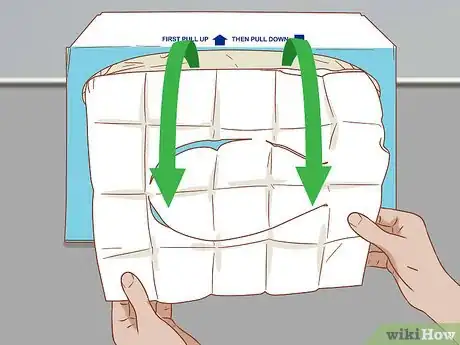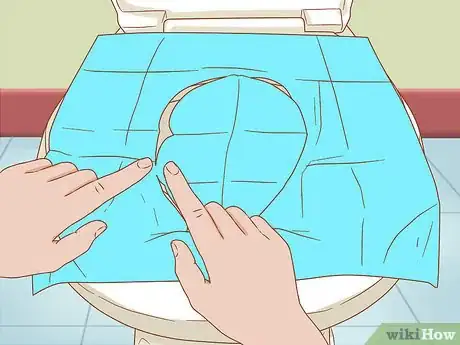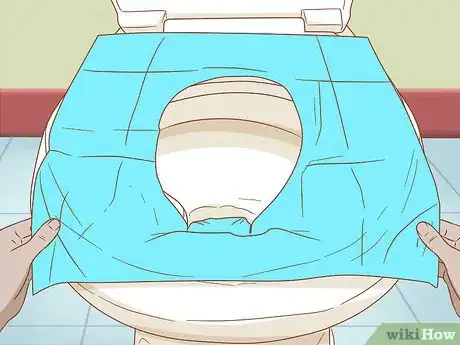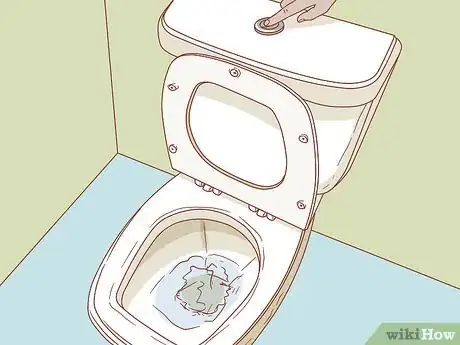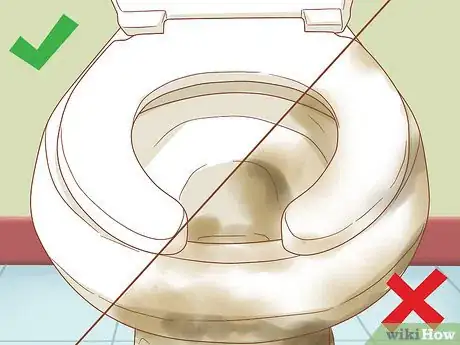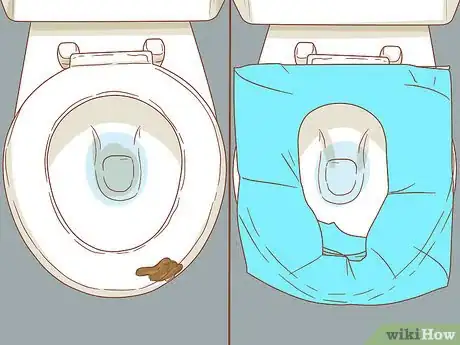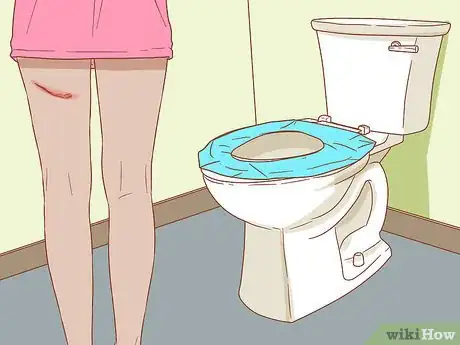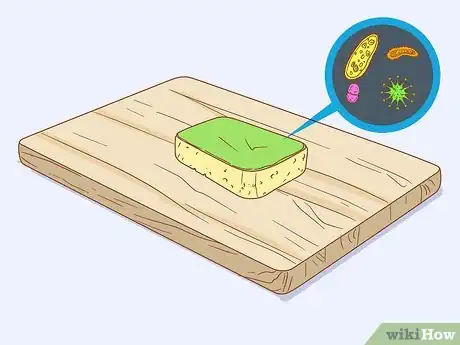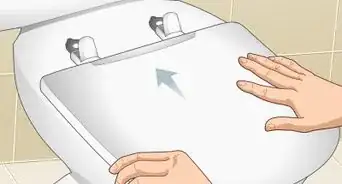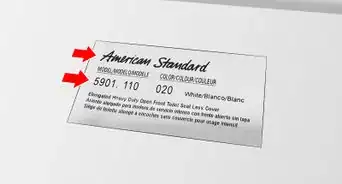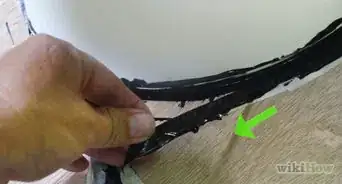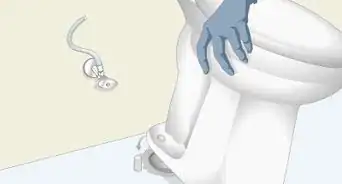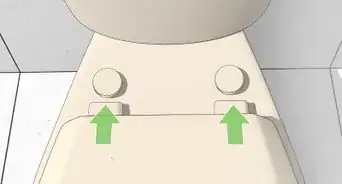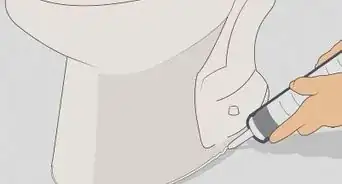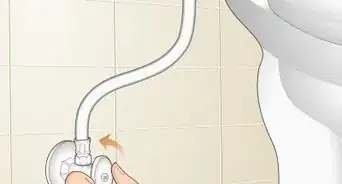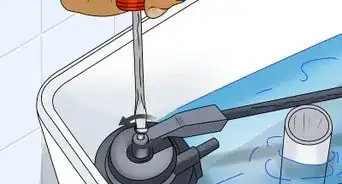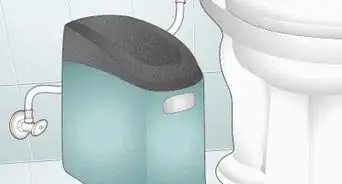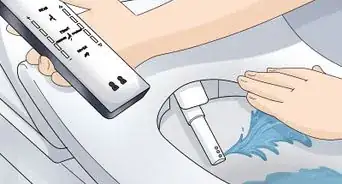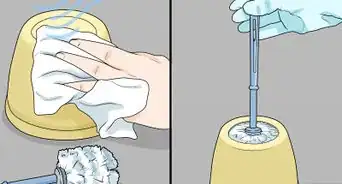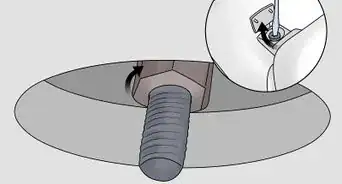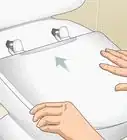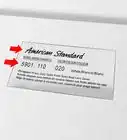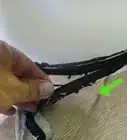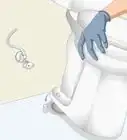This article was co-authored by wikiHow Staff. Our trained team of editors and researchers validate articles for accuracy and comprehensiveness. wikiHow's Content Management Team carefully monitors the work from our editorial staff to ensure that each article is backed by trusted research and meets our high quality standards.
There are 8 references cited in this article, which can be found at the bottom of the page.
This article has been viewed 240,270 times.
Learn more...
Toilet seat covers are often used as a layer of defense against germs in public bathrooms. If a toilet is overall rather clean, you likely don’t need to use a cover. If the toilet is not in acceptable condition, pull out the cover and place it so the flap hangs into the bowl. When you finish using the bathroom, simply flush the toilet to dispose of the cover.
Things You Should Know
- Drape a cover on top of the seat with the middle flap pointing inwards.
- Rip the 3 joints surrounding the middle flap so it falls directly into the toilet.
- Flush the cover down the toilet once you're done using it.
- Use a toilet seat cover if the toilet is dirty or if you have an open cut or wound on your bottom.
Steps
Laying Down a Toilet Seat Cover
-
1Pull the toilet seat cover straight out of the container. Enter the stall, and look for the plastic container housing the toilet seat covers. Grip the outside of one, and pull it up gently to separate it from the rest.[1]
- The cover should come out easily with little effort.
-
2Pinch the 3 inside joints to release the middle flap section. Along the “bowl” of the cover are 3 small attachments of paper securing the flap to the outer ring. Before you set the cover down, gently rip off these joints with your fingers so the flap can fall inside the bowl. There is 1 joint on the left side, 1 in the middle, and 1 on the right side.[2]
- You can simply pinch the paper and the joints should easily rip off.
- As you do this, avoid ripping off the entire flap.
Advertisement -
3Place the seat cover onto the toilet so the flap goes inside the bowl. The flap of the toilet seat cover is the middle, circular section. Align the flap so it falls inside the bowl and the outer ring covers the seat of the toilet completely. The part of the cover where the flap is still connected should meet the front edge of the toilet, opposite the flushing mechanism.[3]
- If you put the toilet seat on backward, that’s okay! It really doesn’t matter, as long as the toilet seat is covered.
-
4Flush the toilet when finished to automatically dispose of the seat cover. When you finish using the bathroom, you don’t have to take off the cover and dispose of it. The covers are made from a material that breaks down in the water. Simply flush it when you finish.[4]
Deciding When to Use a Cover
-
1Inspect the toilet to determine its overall condition. When you enter the public bathroom, select a stall with a clean seat and bowl, if you can. If the toilet is spot-free and white, you can use it without adding the cover. Toilet seats are not a threat for germs or disease unless they are very dirty or in rough condition.[5]
- When you are in a bathroom with multiple stalls, feel free to look at a few and go with the cleanest one.
- You can base your decision on overall cleanliness and personal opinion.
-
2Cover the toilet seat if there is visible urine or debris. If the toilet seat is dirty, it’s a good idea to use a cover. Do this if you see any drops of liquid, dirt, or debris on the seat or around the toilet bowl.[6]
-
3Opt for the toilet seat cover if you have any cuts or open wounds. If you have a scratch or blemish on your bottom, it’s a good idea to use a toilet seat cover, as germs are more likely to spread through open wounds.[7]
- In these cases, toilet seat covers work well as another layer of defense against bacteria.
-
4Understand that other household items often have more germs. Items like sponges, cutting boards, and kitchen counters often have more germs than a toilet seat. In general, toilet seats are rather clean comparatively. Keep this in mind when deciding whether or not to use a toilet seat cover.[8]
- Disposable toilet seat covers can be wasteful and harmful for the environment, so try to limit how often you use them.
References
- ↑ https://youtu.be/GsW340KyAOQ?t=13s
- ↑ https://youtu.be/MFFbEc1aIkY?t=9s
- ↑ https://youtu.be/GsW340KyAOQ?t=33s
- ↑ https://youtu.be/MFFbEc1aIkY?t=24s
- ↑ https://youtu.be/FFrbmYpvC4I?t=27s
- ↑ https://fivethirtyeight.com/features/toilet-seat-covers-evidence-on-impact/
- ↑ https://youtu.be/FFrbmYpvC4I?t=43s
- ↑ http://time.com/5182826/how-to-use-a-toilet-seat-cover/
About This Article
If you need to use a toilet seat cover, look for the plastic container inside the bathroom stall that holds the paper covers. Grip one of the covers and pull it up gently to separate it from the rest. Before you set the cover down, rip off the 3 joints connecting the flap to the outer ring of the cover. If you simply pinch the paper, the joints should rip off without ruining the rest of the flap. Once the flap is loose, place the seat cover on the toilet so the flap falls inside the front of the bowl. When you’re done using the toilet, keep the cover on and flush, since the water will carry it away. For more help, like how to know when to use a toilet seat cover, read on.
